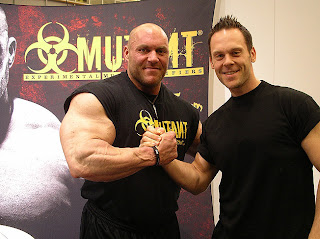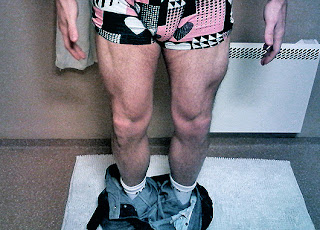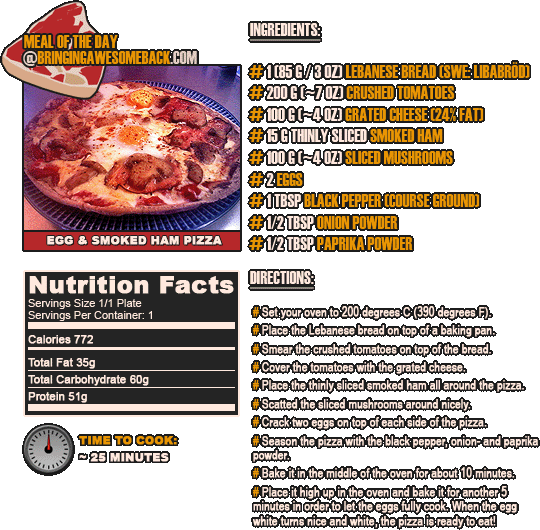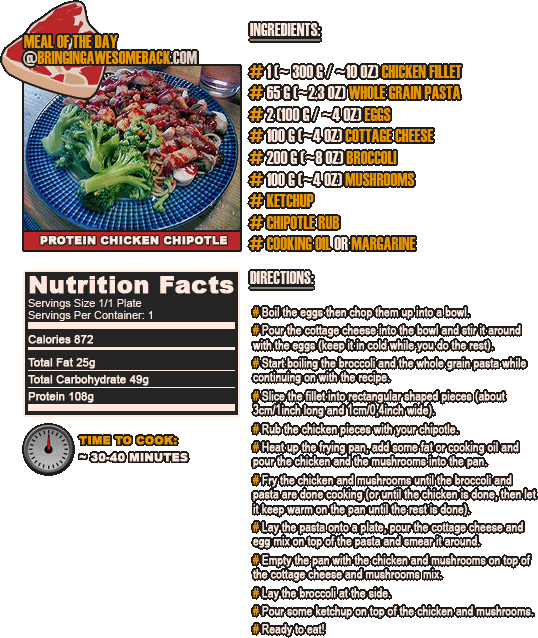Before you read on ahead, I want you to keep in mind that these are merely reflections and thoughts of mine, and do not really correlate that well with any activity concerning professional training - which is quite different from what an average everyday Joe normally should be concerned with. What I say is what I personally believe in and should in no way be viewed as common practice.

One thing I've found throughout my training is that it's very easy to neglect your body. Especially when you're right in the beginning of things and your body has not yet come to that point where the amount of physical activity is overwhelming. When you start out it's easy to think you're superman. It's easy to ignore the warning signs and train harder and harder in hopes of reaching the result you want faster. This is something that often can result in the opposite effect than the one you sought out to achieve, giving you worse results than you wanted. I'm therefore going to talk a bit about the importance of taking care of your body in correlation with the mistakes I've done and what I've learned from them. Hopefully they'll serve as good examples for you who are just starting out or perhaps are pushing yourselves beyond what's good for you.
"If you don't succeed it's not because you are a failure or not as good
as the ones you're mimicking. It's most likely because you've not
adapted it to your personal lifestyle and what works for you."
As a final reminder before you read on, I urge you to keep in mind that what works for someone else doesn't necessarily work for you. And I say this because I know it's easy to be discouraged when you set out to try something new and it turns out overwhelming. Don't get discouraged. If you don't succeed it's not because you are a failure or not as good as the ones you're mimicking. It's most likely because you've not adapted it to your personal lifestyle and what works for you.
#1: Finding boundaries and the issues of learning-by-doing
The initial hassle of letting your body recover is finding your own boundaries. This means finding out how far you can push yourself as far as training goes. One of the reasons why it's fairly hard to do this is because it's something that is highly personal. When starting out, we're quite commonly viewing others, mimicking what they do in hope of achieving the same results. Initially this is a rather good way of learning how the world works (including how to train as well), but it makes us vulnerable to a number of things. First of all, through learning-by-doing we often do as we think other people do, and what we think other people do is not necessarily always the case.

There are many people out there (and definitely a lot of bodybuilders) glorifying their lives as being hardcore - advocating hours in the gym with gruesome workouts. The reality of this might not always be as impressive as they proclaim. To begin with, they might choose to let you see only the successful part of their lives, leaving the not so successful part, such as torn muscles, painkillers, constant need of medical care etc. out of the picture. Adding to that, they might not even live the life they are claiming to live.
"When starting out, we're quite commonly viewing others, mimicking what they do in hope of achieving the same results. Initially this is a rather good way of learning how the world works (including how to train as well), but it makes us vulnerable to a number of things."
Therefore, in the first step of recovery and finding your boundaries it's important to listen to your own body. Find out what works for you, where your limits are and how far you can go. If John Doe Bodybuilder can work out 6 days a week with only 1 day of rest, it doesn't mean you can. Not necessarily because his body can endure it better than yours, but maybe it's because his workouts are not as straining for the body as the ones you're doing. Or maybe it's because while your every day job consists of chopping wood in the forest for 8 hours, his might consist of pushing paper behind a desk. The strain of ones body comes from so much more than merely what we do at the gym.
#2: Proper nutrition
One thing that will definitely limit your boundaries is inadequate nutrition. This doesn't just enter in as far as performance at the gym is concerned, this will also indirectly limit you by the fact that it often takes a toll on your rest and quality of sleep (which I'll talk more about later).
When you're not eating properly, no matter if it's because you're eating too much or too little, your body tends to respond to this. At the gym, it's usually in the way of results (performing or not performing). In your everyday life it's usually affecting other things such as your temper, and/or even social life (which in turn can, again, affect your training).
 A common low calorie breakfast consisting of egg,
A common low calorie breakfast consisting of egg,
cottage cheese, vitamin C and coffee used during my cutting period.
So, I guess the question would be: "What is proper nutrition?". There's definitely no easy answer to this that'll cover each and every person. It's all about what you personally need in order to meet the demands of your everyday life (including training). As I hinted about before, you're going to have substantially different needs if you got an everyday job that requires a lot of physical activity, compared to if you don't. Therefore you always have to view your progress and nutrition as something that is dynamic. You can't calculate your intake for your entire life of training. To begin with, your body would adapt to it and the results would stagnate, and furthermore, your everyday life - as well as your body - is probably going to change throughout the years and so will the demands on your body.
Yet, again, what I'm trying to say here is that you need to get a feel for what the proper nutrition for you is. You don't have to be in any way fancy about it and try to keep a count on how much protein you're getting or how much carbohydrates and so on (unless you're cutting and trying to achieve a very low percentage of body fat). It can be as simple as knowing that two cups of rice together with a 7 oz steak will keep you satisfied until the next meal on a day where you do a moderate amount of work. If you know that, you can always experiment with that number. If you're doing more work, you increase the size of the steak, if you do less, you take a bit off the rice and so on. It's the fact that you're in some way keeping track (or at least have a general idea) of what you put into your body that is going to help you keep your body satisfied and aid in its recovery.
"...you're going to have substantially different needs if you got an everyday job that requires a lot of physical activity, compared to if you don't."
A mistake that I've often done is relying too much on what I thought was right rather than listening to my own body. There have been periods of time during diet where I felt that my body wasn't getting what it needed. There's a thin line between what will end up with you just being hungry and what will end up with you being seriously ill. I foolishly crossed it a few times without giving in, eating only what I was supposed to according to my diet plan, rather than listening to what my body was saying. This could have meant adding a cheat meal, some extra carbohydrates, or something along the line, rather than just staying the path and eating only what was in the plan. It was however a very valuable lesson, and I've come to learn how to read and filter the signals the body is giving - which ones can be ignored, and which ones cannot.
The crucial part of nutrition is most likely going to be more important if you're trying to cut rather than if you're trying to bulk up. If you're cutting and you're reaching a point where you're on a very low fat percentage, you're definitely going to have to worry about this part much more. If you're bulking up and gradually gaining weight, the worst that'll happen is most likely that you'll be overeating or maybe staying the same weight (or perhaps even losing a little). Nevertheless it's not in any way comparable to cutting as far the thoroughness goes, where - in a lot of cases - you'd be worried about not keeping the muscle mass.
#3: Sleeping habits and rest
Train, eat, sleep. That's what a lot people mention when it comes to training and reaching results. There's a lot to be said about this, even if it's far from the whole truth. Even if you train hard, read up on all the latest workout routines, eat properly and do everything by the book, you can still be held back by the lack of sleep - for it is vital when it comes to recovery.

Muscles need rest in order to grow, and a prime time for them to rest is while sleeping. I'm pretty sure that many of you have noticed the lack of performance in your everyday life when continuous nights of sleep have been disrupted. This naturally interferes with training as well. If you have a highly active life and you're trying to combine that with a highly active training life as well, it is crucial to at least focus on a healthy sleep pattern.
What I've found through my years of training is that one of the factors that contribute to a healthy sleep pattern is regularity. This doesn't just mean getting up or going to bed at the same time each day (even though they are in fact two excellent ways), but it also includes keeping regularity in your everyday life. Keeping some kind of structure is important as it enables you to prepare for obstacles that may interfere with your living. For instance: even if you do go to bed every night at the exact same time in hopes of getting a healthy sleep pattern, you won't get much sleep if your mind is occupied with things surrounding your social life. If you've got regularity, then you can manage your time more efficiently, which enables you to plan ahead and not let the planning enter into your bedtime (which is where many of us try to solve the daily issues). The reason why I mention this is because many of us are already suffering from lack of time and if we are to enter training into the equation, we're adding to the everyday load.
"Keeping some kind of structure is important as it enables you to prepare for obstacles that may interfere with your living."
Having this said, no matter how much you plan your days, you're eventually going to hit your limit if you don't rest and take a day off from training. I've been as stubborn as any other person, constantly driving my own body further and further until it finally gives up. In my case I got off pretty easy by only ending up with acute headache due to overly strained muscles. It took a few weeks of very light training and adding more rest to my routine before I could start getting back to where I was, but it sure wasn't worth it. I didn't get results faster than I wanted and I surely didn't feel as good as I could've been doing during this period of time.
#4: Taking time off and engaging in different social activities
While taking time off to relax and doing something completely different comes naturally to some people, it can actually be a difficult task for some. I know from personal experience that it's easy to get caught up with what you're doing, forgetting about the life around you and only focusing on your training. In a way, doing so can be very helpful. If you were like me and started out heavily overweight at 140 kg (308 lbs), it was useful to zone in on just training in order to constantly drive myself further and thereby pushing myself into losing more weight. But it does affect your social life if you go too far with it - sometimes, in ways that you didn't even account for or maybe didn't even think of. An example from my life has been the constant use of lunch boxes. Since I was so determined to lose weight, I refused to eat anything other than what I thought would be proper nutrition. And what I thought was proper was handily available in my lunch box that I carried with me at all times. This would result in people sometimes taking offence as it is not courteous to eat a lunch box when you're at someone's birthday, or when it's Christmas, or when you're having a pick-nick out with friends. From my point-of-view it was justified as I was working hard and trying to achieve something extraordinary. From their point-of-view, they saw someone not engaging in a social event. Food is more than just fuel for your body, it's also a way to interact and socialize.
"From my point-of-view it was justified as I was working hard and trying to achieve something extraordinary. From their point-of-view, they saw someone not engaging in a social event. Food is more than just fuel for your body, it's also a way to interact and socialize."
Why I'm mentioning this example to begin with is not necessarily because I believe that you ought to engage in these social events for the sake of others (even though thinking of other people than yourself is healthy), but even from a selfish point-of-view it is helpful to do so. The reason for this is because it's easy to get too caught up and going a straight line without any change or progress in neither your diet nor training. Without any kind of change, your body will adapt and your progress will stagnate. Taking time off, doing something different is an excellent way of adding some variation to your life as well as training. Not to mention it gives you a valuable lesson about what's really worth something. On top of that, it'll most of the time serve you in a positive way rather than a negative if it's done under moderate circumstances - both mentally as well as physically.
#5: The importance of massage (physical therapy)
Your body is what you've got to work with when it comes to training. Just as any other tool would eventually become defect from years of use and no maintenance, so would your body if you don't treat it properly. Therefore it's important to keep your body in the best of condition, and one of the ways to do this is through some kind of physical therapy. But this is where many of us bump into trouble, because physical therapy of any kind is quite often expensive.
 My girlfriend (who is a licensed massage therapist) giving me a massage.
My girlfriend (who is a licensed massage therapist) giving me a massage.
For me, I'm one of the lucky few that is blessed with a girlfriend who is a licensed massage therapist. This is something that's been a big support for me. Many issues in the gym have been avoided thanks to a quick treatment. One of the reasons why I advocate regular massage is not just due to the benefits it holds by itself, but also because having some kind of regular check-up is a good way for you to step out of yourself and take a view from a third-person perspective. If you're focusing too hard on what's on ahead (may it be dieting or lifting heavy), it's easy to trivialize a bad condition of your body. Therefore it's equally important to find a massage therapist that you are happy with - someone that understands your training and what you're trying to accomplish. Through this, you've got yourself a second opinion that helps you adjust your pace to your own body. Sure enough, that person could perhaps just as well be a close friend, but a close friend would not have the same knowledge about the human body, nor the knowledge about how to treat the current issues you may be struggling with.
"One of the reasons why I advocate regular massage is not just due to the benefits it holds by itself, but also because having some kind of regular check-up is a good way for you to step out of yourself and take a view from a third-person perspective."
Still, there is - as I hinted before - an economical issue related to this. But it all comes down to prioritizing. Perhaps you could afford once a month to begin with. Naturally most issues are not solved with just one treatment, and one month between each treatment is usually a rather long time. However, if you view it as something beneficial for your progress, a way to keep track of the condition you're in, then that one time could still be worth it.
Summary
The thing to take with you here is that everything is connected. While not eating properly and not getting enough rest are both factors that can be detrimental to your recovery by themselves, they tend to be entwined. Meaning, if you're not getting enough sleep, your eating habits might be disrupted and if you're not getting enough food, your sleeping habits might be disrupted, and so on. Always listen to your body, because ignoring it can be dangerous and lead to serious acute injuries as well as long-term conditions. What is one month of "hardcore" training worth if it means you have to spend 6 months doing no training at all due to recovery from a serious injury?
Finally, and more importantly, always remember that we're all different. Learn from what other people do, but adapt it to your own lifestyle before you try it out.









































